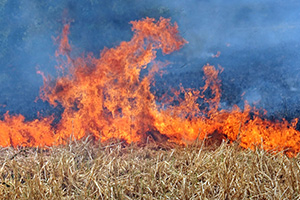UPDATED SEPTEMBER 2023
 Harvest is a busy time for many farms. As cooler temperatures replace summer heat, crops begin to dry down rapidly, increasing risk for dangerous fires on the farm. Hot equipment or engine sparks interacting with dry plant material and grain dust can become a highly combustible combination, making field fires a major concern for farmers.
Harvest is a busy time for many farms. As cooler temperatures replace summer heat, crops begin to dry down rapidly, increasing risk for dangerous fires on the farm. Hot equipment or engine sparks interacting with dry plant material and grain dust can become a highly combustible combination, making field fires a major concern for farmers.
SAFETY CHECKLIST
- Do you regularly clean areas where chaff or plant material can build up? (Try an air compressor or leaf blower to remove crop residue, and a pressure washer to remove built up oil or caked-on grease.)
- Have you checked that bearings and gears are well lubricated and there are no worn bearings or other areas that could overheat?
- Did you check for damaged wires with worn insulation or frayed belts?
- Have you checked that fuses match the recommended capacity?
- Are exhaust systems in good repair/conditions, with preventative measures like a spark arrestor?
- Have you made sure engines are off and hot engines have cooled for at least 15 minutes when refueling equipment?
- Have you extinguished all open flames before refueling?
- Are any repairs needed to fix leaks in the fuel system? Did you wipe away any excess fuel that spilled on the engine, let fumes dissipate before starting the engine, and remove oily rags that are placed near equipment or in the cab?
- Do you have two working and charged fire extinguishers on the combine, tractor or grain hauling equipment? Do you have one in the cab and one to access from the ground?
- Are you carrying a cell phone or an alternative to communicate with others in case of an emergency?
- Have you checked the weather one to two weeks in advance or daily to note any forecasted extreme weather events?
You and/or your employee(s) can use this form to complete safety checks on your farm. Use the form below to list additional safety checks you think are important when inspecting your farm. Keep the completed forms for follow-up, future reference and inspections.
DOWNLOAD PDF CHECKLIST
